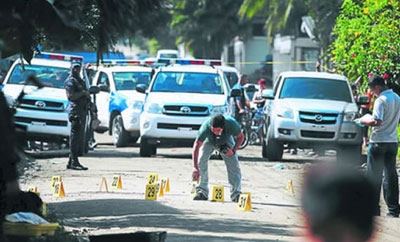Honduras has registered an average of more than ten massacres per month in the first nine months of the year, a sign of the continued prevalence of organized crime and dire security situation in the country.
According to the country’s Violence Observatory, 96 massacres occurred between January and September, representing an average of just over 10 per month. The figure represents a slight acceleration in the pattern in recent months, after 62 massacres were reported in the first six months of the year, reported La Prensa. A massacre is defined as any incident involving the killing of three or more people.
If the pattern continues until the year’s end, Honduras is on course to drastically exceed the 115 massacres registered last year.
Despite the rise in massacres, the national homicide rate has actually dropped from 85.5 per 100,000 in 2012 to 83 per 100,000 so far this year, reported El Heraldo. However, such a drop was predicted by the observatory earlier this year, based on the country’s population growth, and the current rate represents a reduction only half the size of the predicted six percent drop.
InSight Crime Analysis
As these statistics demonstrate, the situation in Honduras is bleak. The most violent country in the world outside of active warzones, and home to the most violent city, the Central American nation is arguably on the brink of collapse.
SEE ALSO: Honduras News and Profiles
Such a huge tally of massacres in Honduras is indicative of the presence of organized crime groups, which more often than not are behind multiple homicides. In addition to homegrown street gangs, Honduras has seen the growing presence of transnational groups in recent years as Mexican cartels have set up in the country to both escape the pressure exerted by their own government’s and to secure key drug trafficking territory.
The situation has been exacerbated by institutional weakness and rampant corruption, which permeates all levels of state institutions and public service, from the police on the ground, to business and political elites. Under these conditions, it is difficult to see how Honduras can effectively bring the security situation under control.

